The War of 1812 Essay
- To find inspiration for your paper and overcome writer’s block
- As a source of information (ensure proper referencing)
- As a template for you assignment
The War of 1812 was fought between the United States of America and the provinces of the British North America, especially the Upper Canada (Ontario), Lower Canada (Quebec), New Brunswick, Newfoundland, Nova Scotia, Prince Edward Island, Cape Breton Island and Bermuda. It took place between 1812 and 1815 and was staged mainly at the Atlantic Ocean and the waters along the Northern Americas.
There are many immediate causes that led United States to declare the war. It all began in 1807 when Britain came up with trade restrictions to hinder the United States from trading with France, which was a strong rival of the Britain. The United States argued that according to the International laws of trade it was wrong to impose the restrictions.
Apart from that, the British military had assisted the American Indians to attack American settlers in the Northwest further worsening their failing relations. The Indians attacks prevented the U.S. from expanding towards the Northwest Territories, which is currently occupied by states of Ohio, Indiana, Illinois, Wisconsin and Michigan. The British argued that the aim of the U.S. was to annex some parts of Canada (Pearson, 254).
Another cause of the War of 1812 was the fruitless attempt of the United States to exploit its irredentist and imperialistic interests and uphold its honors as they considered the Britain challenge to be insult. This war led to massive loss of lives and property but neither of the irredentists lost their territories.
The war ended with signing of the Treaty of Ghent, which created the “status quo ante bellum” assuring the rivals to retain their territories. Unites States and the British North America later came up with the Treaty of 1818, which adjusted borders. The British North America considered the War of 1812 as a success as they defended their territory and it instilled confidence and the militia myth, which led to nationalism among the Canadians.
The Battle of York was staged on 27 th April 1813, at York, which is nowadays known as Toronto. During the War of 1812, an American unit backed by a navy flotilla docked on the Lake Ontario shore near the West, fought the defensive British unit and captured the city and its dock.
The victory of the mission was blemished by acts of plunder and stealing done out by the American units on the British supply chain, which later justified the Burning of Washington by the British units.
The Battle of Stoney Creek was staged in 6 th June 1813 at the time of the War of 1812 in what is nowadays known as Stoney Creek, Ontario. The Americans had victoriously fought the Battle of Fort George, which made the British armies to attack the American camps during the night. The British emerged victors in the war due to the capture of two senior officials of the American unit and the overconfidence of the Americans over the British (Pearson, 310).
The Battle of Beaver Dams was fought on 24 th June 1813, at the time of the Anglo American War of 1812. The battle broke out after Laura Secord delivered a warning of an American effort to attack a British colony at Beaver Dams, Fort George. The Americans were ousted by Native warriors and later surrendered to the commander of the small British deployment.
Major-General Sir Isaac Brook was a British Army official, in charge of Upper Canada since 1802 defending the Upper Canada from the Americans.
Whereas many people in Canada and Britain thought that war could be avoided, Brock was preparing his regiment for a battle that was foreseeable and when the War of 1813 broke out, Brock and his army were ready and easily defeated the Americans in Fort Mackinac and in Detroit. Brock was killed at the Battle of Queenston Heights, which British won.
Tecumseh was a Native American leader of the Shawnee and a great tribal confederacy, which fought against the Americans at the Tecumseh War and at the War of 1812. At the time of the War of 1812, Tecumseh and the tribal confederacy united with the British troops in Canada and assisted in the capturing Fort Detroit.
The American unit under the leadership of Harrison, an American commander, initiated a counterattack on Canada, which led to the Battle of the Thames where Tecumseh died (Pearson 344).

Works Cited
Pearson, Greg. Canadian history: a sense of time . Vancouver, BC: McGraw-Hill Ryerson, 2006. Print.
- The War of 1812 in the American History
- Causes of the 1812 War
- Leave It To Beaver and Desperate Housewives Contrast
- When the State Trembled
- "Breadwinning Daughters: Young Working Women in a Depression-Era City" by Katrina Srigley
- Effects of the Second World
- Introduction to Canadian International relations
- History of Television Broadcasting in Canada Before 1968
- Chicago (A-D)
- Chicago (N-B)
IvyPanda. (2019, April 26). The War of 1812. https://ivypanda.com/essays/the-war-of-1812-essay/
"The War of 1812." IvyPanda , 26 Apr. 2019, ivypanda.com/essays/the-war-of-1812-essay/.
IvyPanda . (2019) 'The War of 1812'. 26 April.
IvyPanda . 2019. "The War of 1812." April 26, 2019. https://ivypanda.com/essays/the-war-of-1812-essay/.
1. IvyPanda . "The War of 1812." April 26, 2019. https://ivypanda.com/essays/the-war-of-1812-essay/.
Bibliography
IvyPanda . "The War of 1812." April 26, 2019. https://ivypanda.com/essays/the-war-of-1812-essay/.
- History Classics
- Your Profile
- Find History on Facebook (Opens in a new window)
- Find History on Twitter (Opens in a new window)
- Find History on YouTube (Opens in a new window)
- Find History on Instagram (Opens in a new window)
- Find History on TikTok (Opens in a new window)
- This Day In History
- History Podcasts
- History Vault
War of 1812
By: History.com Editors
Updated: April 24, 2023 | Original: October 27, 2009

In the War of 1812, the United States took on the greatest naval power in the world, Great Britain, in a conflict that would have an immense impact on the young country’s future. Causes of the war included British attempts to restrict U.S. trade, the Royal Navy’s impressment of American seamen and America’s desire to expand its territory.
The United States suffered many costly defeats at the hands of British, Canadian and Native American troops over the course of the War of 1812, including the capture and burning of the nation’s capital, Washington, D.C., in August 1814. Nonetheless, American troops were able to repulse British invasions in New York, Baltimore and New Orleans, boosting national confidence and fostering a new spirit of patriotism. The ratification of the Treaty of Ghent on February 17, 1815, ended the war but left many of the most contentious questions unresolved. Nonetheless, many in the United States celebrated the War of 1812 as a “second war of independence,” beginning an era of partisan agreement and national pride.
Causes of the War of 1812
At the outset of the 19th century, Great Britain was locked in a long and bitter conflict with Napoleon Bonaparte’s France. In an attempt to cut off supplies from reaching the enemy, both sides attempted to block the United States from trading with the other. In 1807, Britain passed the Orders in Council, which required neutral countries to obtain a license from its authorities before trading with France or French colonies. The Royal Navy also outraged Americans by its practice of impressment, or removing seamen from U.S. merchant vessels and forcing them to serve on behalf of the British.
In 1809, the U.S. Congress repealed Thomas Jefferson ’s unpopular Embargo Act, which by restricting trade had hurt Americans more than either Britain or France. Its replacement, the Non-Intercourse Act, specifically prohibited trade with Britain and France. It also proved ineffective, and in turn was replaced with a May 1810 bill stating that if either power dropped trade restrictions against the United States, Congress would in turn resume non-intercourse with the opposing power.
After Napoleon hinted he would stop restrictions, President James Madison blocked all trade with Britain that November. Meanwhile, new members of Congress elected that year—led by Henry Clay and John C. Calhoun—had begun to agitate for war, based on their indignation over British violations of maritime rights as well as Britain’s encouragement of Native American hostility against American westward expansion .
Did you know? The War of 1812 produced a new generation of great American generals, including Andrew Jackson, Jacob Brown and Winfield Scott, and helped propel no fewer than four men to the presidency: Jackson, John Quincy Adams, James Monroe and William Henry Harrison.
The War of 1812 Breaks Out
In the fall of 1811, Indiana’s territorial governor William Henry Harrison led U.S. troops to victory in the Battle of Tippecanoe . The defeat convinced many Indians in the Northwest Territory (including the celebrated Shawnee chief Tecumseh ) that they needed British support to prevent American settlers from pushing them further out of their lands.
Meanwhile, by late 1811 the so-called “War Hawks” in Congress were putting more and more pressure on Madison, and on June 18, 1812, the president signed a declaration of war against Britain. Though Congress ultimately voted for war, both House and Senate were bitterly divided on the issue. Most Western and Southern congressmen supported war, while Federalists (especially New Englanders who relied heavily on trade with Britain) accused war advocates of using the excuse of maritime rights to promote their expansionist agenda.
In order to strike at Great Britain, U.S. forces almost immediately attacked Canada, which was then a British colony. American officials were overly optimistic about the invasion’s success, especially given how underprepared U.S. troops were at the time. On the other side, they faced a well-managed defense coordinated by Sir Isaac Brock, the British soldier and administrator in charge in Upper Canada (modern Ontario).
On August 16, 1812, the United States suffered a humiliating defeat after Brock and Tecumseh’s forces chased those led by Michigan William Hull across the Canadian border, scaring Hull into surrendering Detroit without any shots fired.
War of 1812: Mixed Results for American Forces
Things looked better for the United States in the West, as Commodore Oliver Hazard Perry’s brilliant success in the Battle of Lake Erie in September 1813 placed the Northwest Territory firmly under American control. Harrison was subsequently able to retake Detroit with a victory in the Battle of Thames (in which Tecumseh was killed). Meanwhile, the U.S. navy had been able to score several victories over the Royal Navy in the early months of the war. With the defeat of Napoleon’s armies in April 1814, however, Britain was able to turn its full attention to the war effort in North America.
As large numbers of troops arrived, British forces raided the Chesapeake Bay and moved in on the U.S. capital, capturing Washington, D.C ., on August 24, 1814, and burning government buildings including the Capitol and the White House .
Inspiration for 'The Star Spangled Banner'
On September 11, 1814, at the Battle of Plattsburgh on Lake Champlain in New York, the American navy soundly defeated the British fleet. And on September 13, 1814, Baltimore’s Fort McHenry withstood 25 hours of bombardment by the British Navy.
The following morning, the fort’s soldiers hoisted an enormous American flag, a sight that inspired Francis Scott Key to write a poem that would later be set to music and become known as “ The Star-Spangled Banner .” (Set to the tune of an old English drinking song, it would later be adopted as the U.S. national anthem.) British forces subsequently left the Chesapeake Bay and began gathering their efforts for a campaign against New Orleans .
End of the War of 1812 and Its Impact
By that time, peace talks had already begun at Ghent (modern Belgium), and Britain moved for an armistice after the failure of the assault on Baltimore. In the negotiations that followed, the United States gave up its demands to end impressment, while Britain promised to leave Canada’s borders unchanged and abandon efforts to create an Indian state in the Northwest. On December 24, 1814, commissioners signed the Treaty of Ghent , which would be ratified the following February.
On January 8, 1815, unaware that peace had been concluded, British forces mounted a major attack in the Battle of New Orleans , only to meet with defeat at the hands of future U.S. president Andrew Jackson ’s army. News of the battle boosted sagging U.S. morale and left Americans with the taste of victory, despite the fact that the country had achieved none of its pre-war objectives.
Impact of the War of 1812
Though the War of 1812 is remembered as a relatively minor conflict in the United States and Britain, it looms large for Canadians and for Native Americans, who see it as a decisive turning point in their losing struggle to govern themselves. In fact, the war had a far-reaching impact in the United States, as the Treaty of Ghent ended decades of bitter partisan infighting in government and ushered in the so-called “Era of Good Feelings.”
The war also marked the demise of the Federalist Party , which had been accused of being unpatriotic for its antiwar stance, and reinforced a tradition of Anglophobia that had begun during the Revolutionary War. Perhaps most importantly, the war’s outcome boosted national self-confidence and encouraged the growing spirit of American expansionism that would shape the better part of the 19th century.
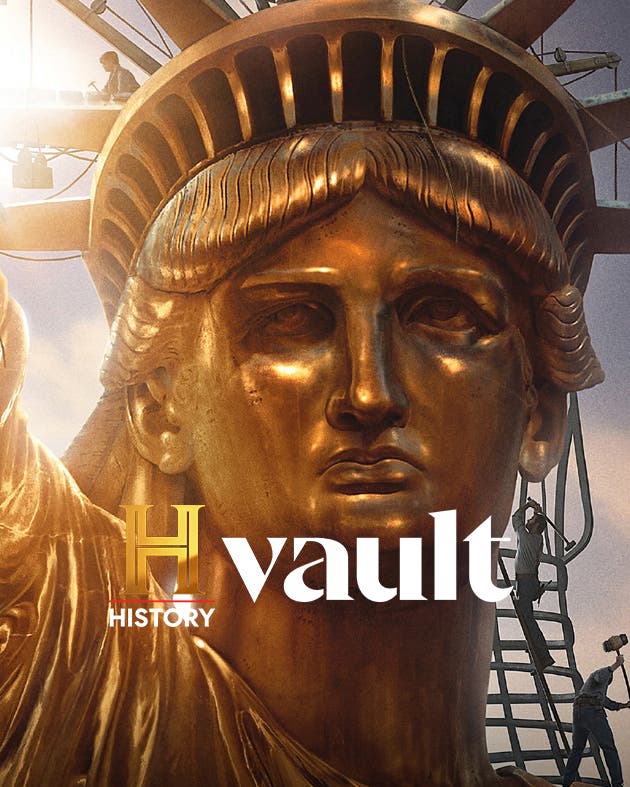
HISTORY Vault
Stream thousands of hours of acclaimed series, probing documentaries and captivating specials commercial-free in HISTORY Vault

Sign up for Inside History
Get HISTORY’s most fascinating stories delivered to your inbox three times a week.
By submitting your information, you agree to receive emails from HISTORY and A+E Networks. You can opt out at any time. You must be 16 years or older and a resident of the United States.
More details : Privacy Notice | Terms of Use | Contact Us
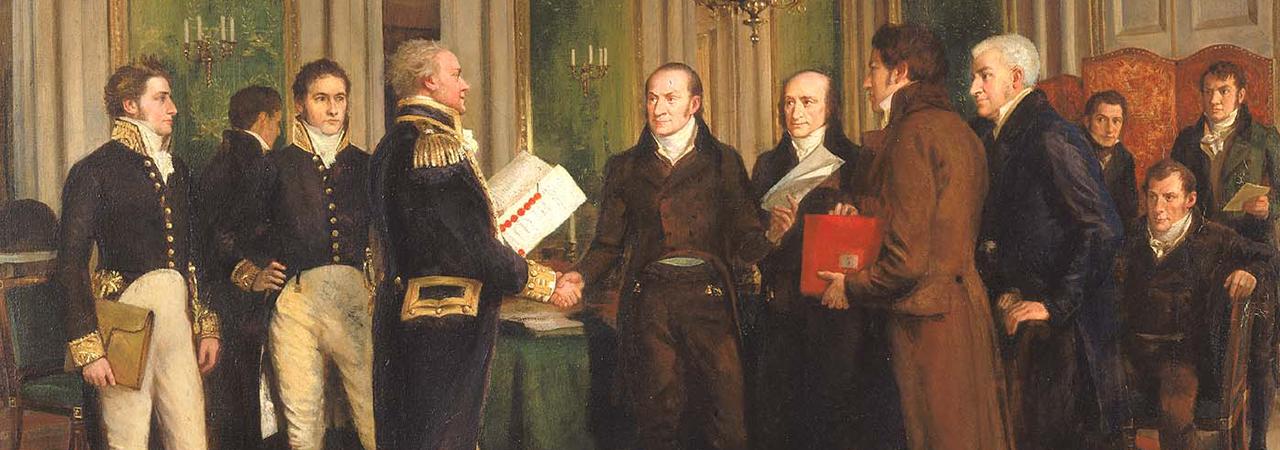
Sir Amédée Forestier, The Signing of the Treaty of Ghent, Christmas Eve, 1814, 1914, oil on canvas, Smithsonian American Art Museum, Gift of the Sulgrave Institution of the U.S. and Great Britain.
War of 1812
The “Second War of Independence”
Sometimes referred to as the “Second War of Independence,” the War of 1812 was the first large scale test of the American republic on the world stage. With the British Navy impressing American sailors, and the British government aiding Native American tribes in their attacks on American citizens on the frontier, Congress, for the first time in our nation’s history, declared war on a foreign nation: Great Britain. Battles raged on the high seas. British soldiers invaded American soil, captured Washington D.C., and even burned the White House. In the end the Star-Spangled Banner waved “O’er the land of the free and the home of the brave.” Explore the battlefields and personalities of this critical time in American history.
Popular Content
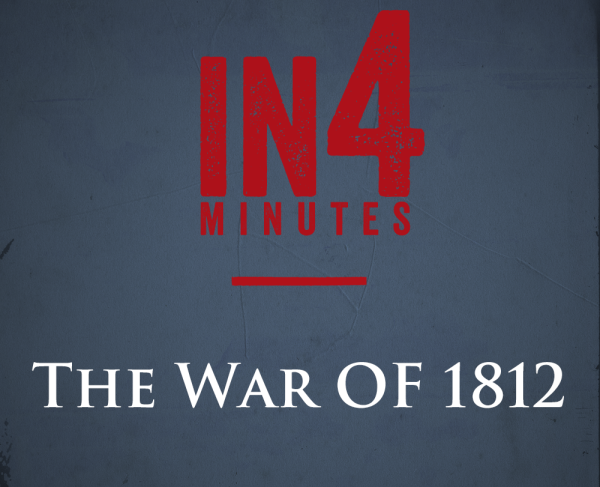
The War of 1812-An Overview
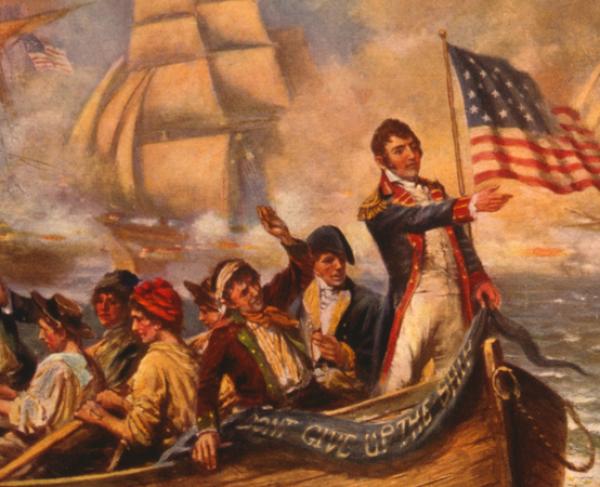
A Brief Overview of the War of 1812
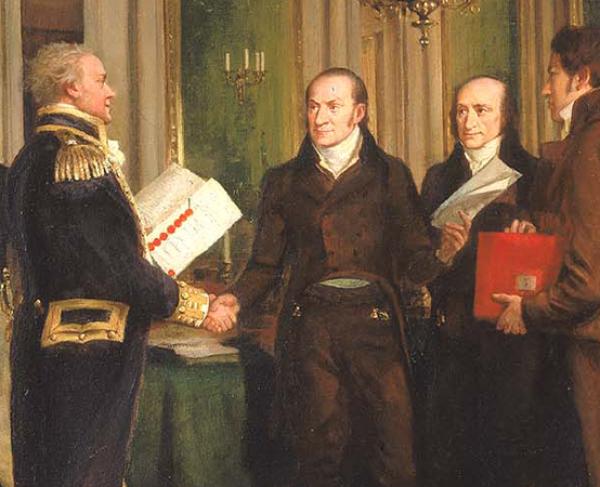
War of 1812 Facts
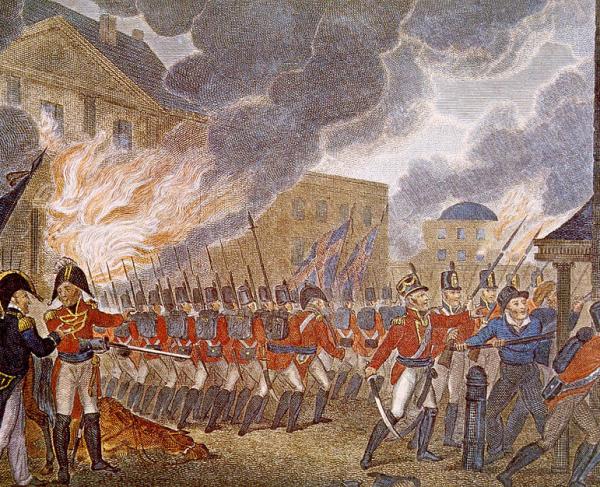
War of 1812 Timeline
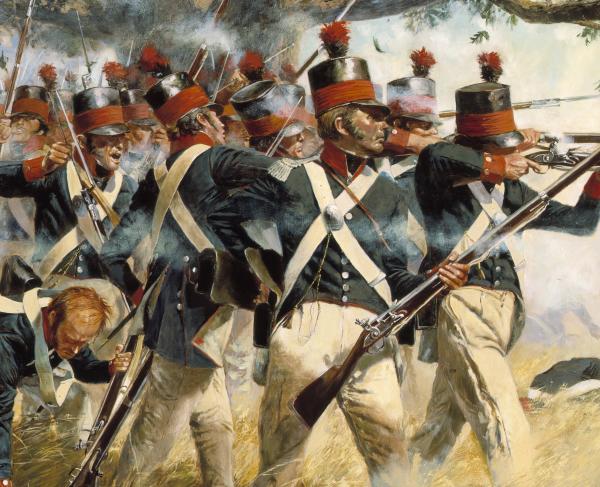
Equipment in the War of 1812
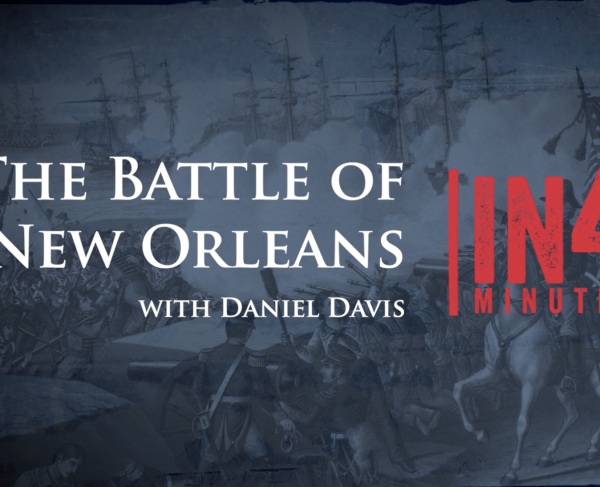
Battle of New Orleans
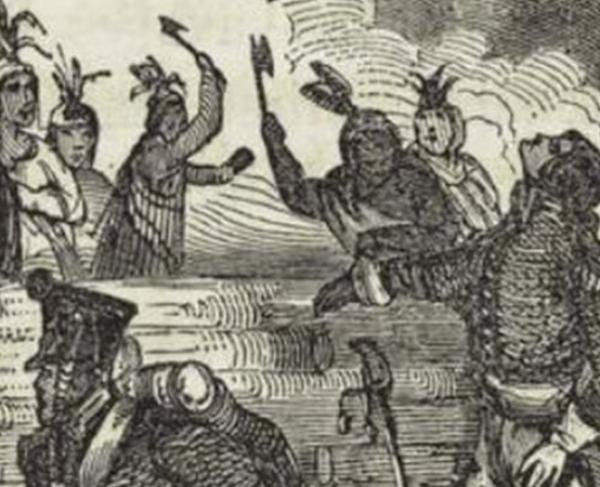

Native American Involvement in the War of 1812
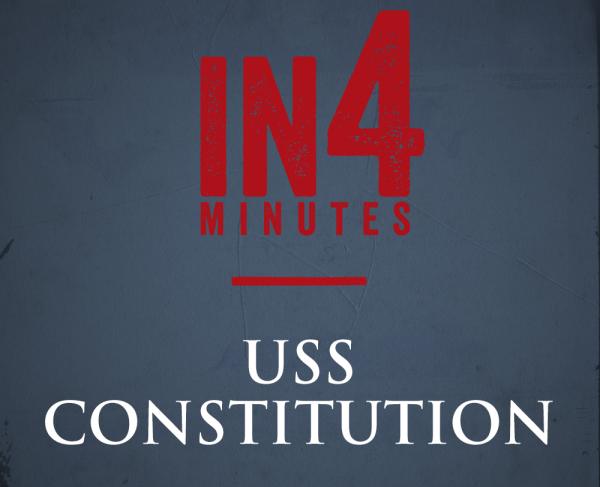
USS Constitution
Battle overviews.
- New Orleans »
- Fort McHenry »
- Tippecanoe »
- Horseshoe Bend »
- York »
- Bladensburg »
- Pensacola (1814) »
- Fort Meigs »
- Chippawa »
- Sackets Harbor »
- River Raisin »
- Lundy's Lane »
- Divisions and Offices
- Grants Search
- Manage Your Award
- NEH's Application Review Process
- Professional Development
- Grantee Communications Toolkit
- NEH Virtual Grant Workshops
- Awards & Honors
- American Tapestry
- Humanities Magazine
- NEH Resources for Native Communities
- Search Our Work
- Office of Communications
- Office of Congressional Affairs
- Office of Data and Evaluation
- Budget / Performance
- Contact NEH
- Equal Employment Opportunity
- Human Resources
- Information Quality
- National Council on the Humanities
- Office of the Inspector General
- Privacy Program
- State and Jurisdictional Humanities Councils
- Office of the Chair
- NEH-DOI Federal Indian Boarding School Initiative Partnership
- NEH Equity Action Plan
- GovDelivery
The War of 1812
Division of public programs.
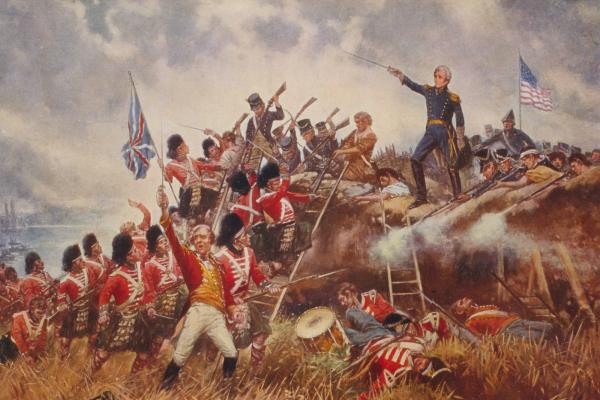
1910 painting by Edward Percy Moran of Battle of New Orleans.
Courtesy of Library of Congress
For two and a half years, Americans fought against the British, Canadian colonists, and native nations in a war that divided the United States so deeply that the nation almost broke apart. Watch the NEH-funded film THE WAR OF 1812 online, supplemented by bonus video material, classroom lesson plans, essays on aspects of the conflict, and a guide to historic battle sites.
Forging America: the War of 1812 Legacy
This essay about the War of 1812 explores its significance as a pivotal moment in American history, often overshadowed by other conflicts like the Revolutionary War and the Civil War. It highlights the factors leading to the war, including tensions between Britain and France and British impressment of American sailors. Despite initial struggles, the war showcased American naval capabilities and ended with the Treaty of Ghent in 1814. The essay emphasizes how the war shaped American national identity, solidifying sovereignty and fostering a sense of unity among citizens. Additionally, it discusses the impact on British foreign policy and the lasting legacy of the conflict on international relations.
How it works
War of 1812 stands how a central moment in American history, what is often darkened by Revolutionary War that was preceded that is why and Civil War, that goes. However, his value can not be zdrobnia. Then there was a conflict that formed the trajectory of the united states, hardening his status how people and influencing on his mutual relations with the second world states.
Roots of War of 1812 tracks back to a several linked factors. One of primary catalysts was strong tension between Britain and France, both, that competes for influence Europe.
Practice of Royal Navy of British of requisition, for help what they force recruited the American sailors to service, farther strained mutual relations between the united states and Britain. Additionally, British support of the Native American tribes, what leans to American expansion in North-western Territory additional fuel to the fire. on June, 18, 1812, President James Madison signed declaration of war against Britain, marking the official beginning to the conflict. War was opened on frequent facades, with substantial battles militated on dry land and at sea. In the early phases of war, American zmusza militates against prevailing British military, cladding defeats in battles for example Siege of Detroit and Battle of Height of Queenston. However, American marine victories, exceptionally triumph of Constitution of military ship of the USA above Hms Guerriere in August 1812, provided a very necessary moral increase and proposed callow national marine capabilities on a shop-window. As war behaved, how parties experience successes, so and remains. The British blockade of American ports in earnest influenced on the American economy, conduces to economic difficulties and dissatisfaction among a population. Meantime, American zmusza, under guidance figures for example General Andrew Jackson, attained decision victories, most exceptionally in Battle of new Orlean in January 1815, that took place since Agreement of Ghent was signed but before the news of agreement attained fighters. This victory propped up American morale and fixed national sense to unity and pride. Agreement of Ghent, engaged on Decembers, 24, 1814, actually sheathed the Sword 1812. Not without regard to what side, what arrives at expressive victory, an agreement renewed pre-war distances and was capable not to appeal to the problems that foremost sparkled conflict, for example requisition and Native American resistance. However, war had deep consequences how for the united states, so and Britain.
For the united states, War 1812 marked a turning point in his national identity. A conflict served, to harden national sovereignty and independence from Britain, laying foundation for his appearance how the world state. To that, war tucked in a fuel sense of nationalism and unity among Americans, encouraging public that would stand for generations spirit. International, War of 1812 existent substantial values for Britain. While then saved his status as global superpower, a conflict separated the calls of support of control above remote child’s camps and territories, especially in the face of certain resistance. In addition, war assisted the overvalue of the British foreign policy, conduces to the anymore conciliator approaches in the direction of the states united in years, that goes.
Upon completion, War 1812 was a moment, what yields to transformation, in American history, forming a national identity and his mutual relations with the second world states. While often darkened by the second conflicts, his inheritance prolongs to philosophize, reminds us about a fight and sacrifices, then torowa?o a road, that the united states became people, viz. today.
Cite this page
Forging America: The War of 1812 Legacy. (2024, Mar 25). Retrieved from https://papersowl.com/examples/forging-america-the-war-of-1812-legacy/
"Forging America: The War of 1812 Legacy." PapersOwl.com , 25 Mar 2024, https://papersowl.com/examples/forging-america-the-war-of-1812-legacy/
PapersOwl.com. (2024). Forging America: The War of 1812 Legacy . [Online]. Available at: https://papersowl.com/examples/forging-america-the-war-of-1812-legacy/ [Accessed: 8 Jun. 2024]
"Forging America: The War of 1812 Legacy." PapersOwl.com, Mar 25, 2024. Accessed June 8, 2024. https://papersowl.com/examples/forging-america-the-war-of-1812-legacy/
"Forging America: The War of 1812 Legacy," PapersOwl.com , 25-Mar-2024. [Online]. Available: https://papersowl.com/examples/forging-america-the-war-of-1812-legacy/. [Accessed: 8-Jun-2024]
PapersOwl.com. (2024). Forging America: The War of 1812 Legacy . [Online]. Available at: https://papersowl.com/examples/forging-america-the-war-of-1812-legacy/ [Accessed: 8-Jun-2024]
Don't let plagiarism ruin your grade
Hire a writer to get a unique paper crafted to your needs.

Our writers will help you fix any mistakes and get an A+!
Please check your inbox.
You can order an original essay written according to your instructions.
Trusted by over 1 million students worldwide
1. Tell Us Your Requirements
2. Pick your perfect writer
3. Get Your Paper and Pay
Hi! I'm Amy, your personal assistant!
Don't know where to start? Give me your paper requirements and I connect you to an academic expert.
short deadlines
100% Plagiarism-Free
Certified writers
Home — Essay Samples — History — American History — The Lasting Impacts of the War of 1812 on the United States
The Lasting Impacts of The War of 1812 on The United States
- Categories: African American History American History
About this sample

Words: 452 |
Published: Jan 29, 2024
Words: 452 | Page: 1 | 3 min read
Table of contents
Political impacts, economic impacts, national identity impacts.
- Latimer, J. (2007). 1812: War with America. Cambridge, MA: Belknap Press of Harvard University Press.
- Perkins, B. (2002). Castlereagh and Adams: England and the United States, 1812-1823. London: Leicester University Press.
- Heidler, D. S., & Heidler, J. T. (2004). Encyclopedia of the War of 1812. Santa Barbara, CA: ABC-CLIO.

Cite this Essay
Let us write you an essay from scratch
- 450+ experts on 30 subjects ready to help
- Custom essay delivered in as few as 3 hours
Get high-quality help

Dr. Heisenberg
Verified writer
- Expert in: History

+ 120 experts online
By clicking “Check Writers’ Offers”, you agree to our terms of service and privacy policy . We’ll occasionally send you promo and account related email
No need to pay just yet!
Related Essays
3 pages / 1363 words
2 pages / 757 words
1 pages / 637 words
3 pages / 1286 words
Remember! This is just a sample.
You can get your custom paper by one of our expert writers.
121 writers online
Still can’t find what you need?
Browse our vast selection of original essay samples, each expertly formatted and styled
Related Essays on American History
Westward expansion is a crucial chapter in American history that played a significant role in shaping its culture, economy, and politics. As settlers moved westward, they encountered new challenges, opportunities, and conflicts [...]
The term "hyphenated American" has been used for over a century to describe individuals in the United States who identify with both their ancestral or ethnic heritage and their American nationality. It's a label that has [...]
America, a nation marked by its continual evolution, has witnessed profound transformations in its history. This essay embarks on how America has changed over time, spanning political, social, and economic domains. It delves [...]
The Stamp Act of 1765 is a landmark event in American history that played a crucial role in shaping the nation's path toward independence. This essay explores the historical context, significance, and consequences of the Stamp [...]
The early settlement of Jamestown in 1607 marked a pivotal moment in American history, as it was the first permanent English settlement in North America. This essay will explore the challenges faced by the Jamestown settlers and [...]
Track and field may seem like it's boring and a waste of time. No one really wants to sit around in the hot sun just watching random people run as fast as possible. Believe me that no one will intentionally put themselves in [...]
Related Topics
By clicking “Send”, you agree to our Terms of service and Privacy statement . We will occasionally send you account related emails.
Where do you want us to send this sample?
By clicking “Continue”, you agree to our terms of service and privacy policy.
Be careful. This essay is not unique
This essay was donated by a student and is likely to have been used and submitted before
Download this Sample
Free samples may contain mistakes and not unique parts
Sorry, we could not paraphrase this essay. Our professional writers can rewrite it and get you a unique paper.
Please check your inbox.
We can write you a custom essay that will follow your exact instructions and meet the deadlines. Let's fix your grades together!
Get Your Personalized Essay in 3 Hours or Less!
We use cookies to personalyze your web-site experience. By continuing we’ll assume you board with our cookie policy .
- Instructions Followed To The Letter
- Deadlines Met At Every Stage
- Unique And Plagiarism Free
- Search Menu
- Sign in through your institution
- Author Guidelines
- Open Access Options
- Why Publish with JAH?
- About Journal of American History
- About the Organization of American Historians
- Editorial Board
- Advertising and Corporate Services
- Self-Archiving Policy
- Dispatch Dates
- Journals on Oxford Academic
- Books on Oxford Academic
Article Contents
- < Previous
1812: War and the Passions of Patriotism
- Article contents
- Figures & tables
- Supplementary Data
Carroll Smith-Rosenberg, 1812: War and the Passions of Patriotism, Journal of American History , Volume 100, Issue 2, September 2013, Pages 507–508, https://doi.org/10.1093/jahist/jat198
- Permissions Icon Permissions
The War of 1812, known primarily for its military disasters—the burning of Washington, the near capture of Baltimore, the failure to seize Canada—and the diplomatic stalemate that marked the war's end, is easily dismissed as an event of little significance. Not so, Nicole Eustace tells us in her powerful analysis of the political rhetoric the war generated. Despite U.S. military defeats, the war ended the British–Native American coalition, opening the West to rapid white settlement. It transformed a people bitterly divided along class, regional, and ideological lines into an ebullient nation, energized by the task of establishing white dominance over the American continent and confidently embracing a revitalized national self-image as a virtuous, freedom-loving empire. Insisting that the pen is mightier than the sword, Eustace presents the war more as a cultural event than a military one and examines the nation that emerged from the war, re-formed by aggressive Republican party rhetoric.
Email alerts
Citing articles via.
- Process - a blog for american history
- Recommend to your Library
Affiliations
- Online ISSN 1945-2314
- Print ISSN 0021-8723
- Copyright © 2024 Organization of American Historians
- About Oxford Academic
- Publish journals with us
- University press partners
- What we publish
- New features
- Open access
- Institutional account management
- Rights and permissions
- Get help with access
- Accessibility
- Advertising
- Media enquiries
- Oxford University Press
- Oxford Languages
- University of Oxford
Oxford University Press is a department of the University of Oxford. It furthers the University's objective of excellence in research, scholarship, and education by publishing worldwide
- Copyright © 2024 Oxford University Press
- Cookie settings
- Cookie policy
- Privacy policy
- Legal notice
This Feature Is Available To Subscribers Only
Sign In or Create an Account
This PDF is available to Subscribers Only
For full access to this pdf, sign in to an existing account, or purchase an annual subscription.

IMAGES
VIDEO
COMMENTS
The Battle of Beaver Dams was fought on 24 th June 1813, at the time of the Anglo American War of 1812. The battle broke out after Laura Secord delivered a warning of an American effort to attack a British colony at Beaver Dams, Fort George. The Americans were ousted by Native warriors and later surrendered to the commander of the small British ...
The War of 1812, which lasted from June 18, 1812 to February 18, 1815, was a military conflict between the United States, Great Britain, and Great Britain's Native American allies on the North American continent. After the American Revolution, the United States and Great Britain were hardly on good terms. To achieve victory, the United States ...
The War of 1812 had only mixed support on both sides of the Atlantic. The British weren't eager for another conflict, having fought Napoleon for the better part of the previous 20 years, but weren't fond of American commercial support of the French either.The divisions in American sentiment about the war similarly split, oftentimes along geographic lines: New Englanders, particularly ...
Meanwhile, by late 1811 the so-called "War Hawks" in Congress were putting more and more pressure on Madison, and on June 18, 1812, the president signed a declaration of war against Britain.
The "Second War of Independence". Sometimes referred to as the "Second War of Independence," the War of 1812 was the first large scale test of the American republic on the world stage. With the British Navy impressing American sailors, and the British government aiding Native American tribes in their attacks on American citizens on the ...
The War of 1812 for The USA. In the War of 1812, the United States took on the greatest naval power in the world, Great Britain, in a conflict that would have an immense impact on the young country's future. Causes of the war included British attempts to restrict U.S. trade, the Royal Navy's impressment of American seamen and America's ...
The War of 1812 was fought by the United States and its allies against the United Kingdom and its allies in North America.It began when the United States declared war on Britain on 18 June 1812. Although peace terms were agreed upon in the December 1814 Treaty of Ghent, the war did not officially end until the peace treaty was ratified by the United States Congress on 17 February 1815.
The War of 1812. For two and a half years, Americans fought against the British, Canadian colonists, and native nations in a war that divided the United States so deeply that the nation almost broke apart. Watch the NEH-funded film THE WAR OF 1812 online, supplemented by bonus video material, classroom lesson plans, essays on aspects of the ...
On June 1, 1812, President James Madison sent a message to Congress asking for a declaration of war against Great Britain. The House of Representatives passed the declaration of war on June 4, 1812, by a vote of 79 yeas and 49 nays. On June 17, 1812, the Senate passed the declaration by a vote of 19 yeas and 13 nays.
Cite this essay. Download. The War of 1812 was an official fight between the United States and Great Britain. This war was not caused because of US expansion; the main cause that led to this war was the disputes over maritime rights. Britain and America had previous conflicts from the Revolutionary War; therefore, this event added to the tension.
Civil War, and World War II - were all clear-cut successes. Although many people remembered the War of 1812 as a success, it was in a very real sense a failure, and perhaps this is why it attracts so little attention today. The obscurity of this war, however, should not blind us to its significance, for it was an important turning point,
Summary. I. Sometime in late May 1812, James Madison began drafting a "war message" that he would send to Congress on 1 June. As he did so, his mind ranged over the troubled history of Anglo-American relations following the establishment of American independence in 1783. Indeed, Madison even went so far as to allege in his draft that Great ...
This essay about the War of 1812 explores its significance as a pivotal moment in American history, often overshadowed by other conflicts like the Revolutionary War and the Civil War. It highlights the factors leading to the war, including tensions between Britain and France and British impressment of American sailors. Despite initial struggles ...
The War of 1812, fought between the United States and Great Britain, is often overshadowed by the American Revolution and the Civil War. However, it had significant impacts on the United States that affected its political, economic, and national identity.
The War of 1812, known primarily for its military disasters—the burning of Washington, the near capture of Baltimore, the failure to seize Canada—and the diplomatic stalemate that marked the war's end, is easily dismissed as an event of little significance. Not so, Nicole Eustace tells us in her powerful analysis of the political rhetoric ...
Indeed, while standing in the British post of Fort George on the Niagara Peninsula in the summer of 1989, I recall hearing an American tourist protest very loudly that she had no idea that Canada had ever been attacked by the United States. Type. Chapter. Information. The War of 1812.
The War of 1812 - March 2012. To save this book to your Kindle, first ensure [email protected] is added to your Approved Personal Document E-mail List under your Personal Document Settings on the Manage Your Content and Devices page of your Amazon account.
The Papers of James Madison, in conjunction with all the other modern editionsofthepapers ofthefounding fathers,willleadfuturegenerations ofhistorianstoprovide uswithvastlyimproved interpretations ofcritical ... 978--521-89820-1 - The War of 1812: Conflict for a Continent ...